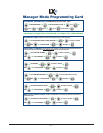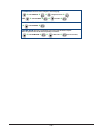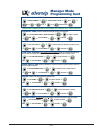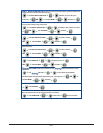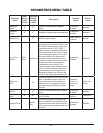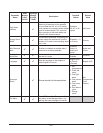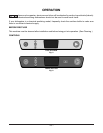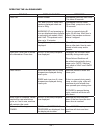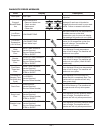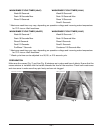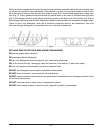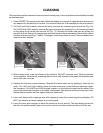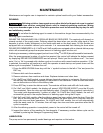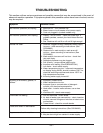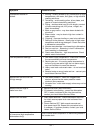
– 30 –
TROUBLESHOOTING
This section outlines various symptoms and possible causes that may be encountered in the event of
abnormal machine operation. If symptoms persist after possible causes have been checked, service
may be required.
Symptom Possible Causes
No machine operation (no display). 1. Machine OFF - turn machine ON.
2. Blown fuse or circuit breaker off at power supply.
3. Cord not plugged in (corded models only)
No machine operation (with display). 1. Display: "DOOR OPEN" - open and close door. If
problem persists, contact your local Hobart Service
Ofce.
2. See "Machine will not ll or will not ll high enough".
Dishes not clean. 1. Strainers clogged causing inadequate water supply
to pump - clean according to instructions. (See
CLEANING.)
2. Obstruction in wash arm(s) or wash arms will
not turn - clean according to instructions. (See
CLEANING.)
3. Wash and/or rinse arms will not turn - check that
they spin freely.
4. Detergent dispenser may be clogged.
5. Soil quantity - scrape dishes before cycle.
6. Improper rack loading. (See PREPARATION.)
7. Low water - check water supply.
8. Water temperature too low - note wash temperature
on display during WASH; should be above 120°F for
chemical sanitizing machines and above 150°F for
high temperature machines.
9. Incoming water supply turned off.
Spotting of silverware, glasses, or
dishes.
1. Improperly loaded racks.
2. Water temperature too low.
3. Improper type or concentration of detergent -
contact your chemical representative.
4. Hard water - install a water softener; use a rinse
agent.
5. Insufcient ll - check water supply.
Chemicals not feeding. 1. Low on chemicals - check levels.
2. Air leak at feeder hose connections - check insertion
of quick connect ttings and wire ties at tube to tube
connections.
3. Tubes kinked - check for smooth bends.
Food soils remain in dishwasher.
Follow daily cleaning instructions. (See CLEANING.)
Appearance of rust in machine. 1. Ensure steel wool is not used to clean machine.
2. May be due to high iron content in water supply.



